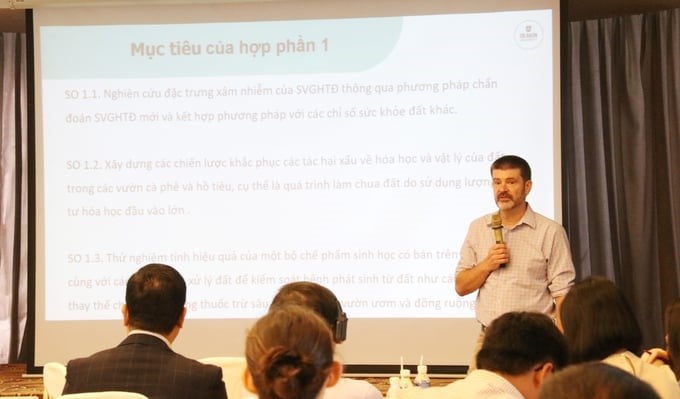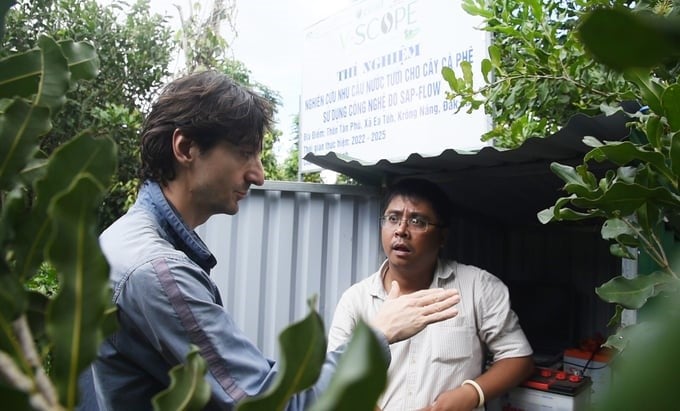November 19, 2025 | 01:06 GMT +7
November 19, 2025 | 01:06 GMT +7
Hotline: 0913.378.918
November 19, 2025 | 01:06 GMT +7
Hotline: 0913.378.918
Recently, the Project "Increasing the sustainability, productivity, and economic value of coffee and black pepper farming systems and value chains in the Central Highlands region of Vietnam" (V-SCOPE Project) held a mid-term review meeting as well as organized field visits for relevant parties.

Experts presented research results for components of the project. Photo: Quang Yen.
This mid-term meeting also heard reports from components of the project. In particular, the components have published research results on methods of controlling pests and diseases in farms and nurseries as well as improving soil health for coffee and black pepper farming.
Through research, the results of the investigation of harmful organisms in soil in 2022 and 2023 show that the symptom rate of quick wilt disease on black pepper plants is 1–5% in all three Central Highlands provinces. About 69% of soil samples collected from the investigated areas had the presence of Phytophthora fungi, mostly at very low densities.
In this component, three species that cause quick wilt disease on black pepper plants in the Central Highlands were also recorded. In testing soil restoration measures in coffee and black pepper gardens, it was found that some gardens in Gia Lai had increased pH, but longer monitoring was needed.
In addition, the V-SCOPE Project has also achieved some specific results in the component on co-design of good agricultural practices in coffee and black pepper crop systems. Initial research shows that irrigation according to current guidelines (400 liters/tree/time) is excessive. However, the project will continue to monitor the data to reach a final conclusion, aimed at opening up meaningful prospects for water savings, especially in agroforestry systems.

The project’s experts research and support people in Dak Lak province. Photo: Quang Yen.
The V-SCOPE project aims to improve the livelihoods of small farmer households and rural communities. The project’s experts support the work of natural resource management and make production more sustainable, as well as promote a more inclusive agro-food market chain through collaboration with the private sector and farmers.
The V-SCOPE project is funded by the Australian Centre for International Agricultural Research (ACIAR) and implemented by the International Centre for Research in Agroforestry (ICRAF), also known as World Agroforestry. The French Agricultural Research Centre for International Development (CIRAD) is the party responsible for providing human resources for the project.
Translated by Huyen Vu Thu

(VAN) Integrating agricultural extension activities with ecotourism development unlocks promising new avenues for localities boasting specific advantages in grape and apple cultivation.

(VAN) Enterprises and cooperatives accompany farmers in Tay Ninh to develop an organic seedless lime growing area, paving the way for poverty reduction.

(VAN) There were times when Pho faltered, yet his aspiration to bring the pure aroma to those who truly value clean tea kept urging him forward.

(VAN) Bich Thao Coffee Cooperative pioneered products achieving the national 5-star OCOP standard, paving the way for Son La coffee to conquer international markets.

(VAN) The Bao La bamboo-and-rattan cooperative has been producing goods integrated into value chains. As a result, its products have reached global markets.

(VAN) The training course in An Giang equips learners with emission verification methods, thus creating a basis for low-emission rice production.

(VAN) Thu Lum commune is focusing on developing medicinal plants under the forest canopy, creating sustainable livelihoods for local people, and contributing to protecting the ecological environment.